Ten Days with Madre
Chapter 12: One night, as I lay in my hammock under the open sky, a clear image came to me. It felt more like a memory than an idea. I saw a circular temple made entirely from the jungle…
One night, as I lay in my hammock under the open sky, a clear image came to me. It felt more like a memory than an idea. I saw a circular temple made entirely from the jungle. A structure held by trees, roofed with broad green leaves, open at the sides to the forest. It was not large, but it felt sacred. A place for ceremony. A place for learning. A space where people from the village and from afar could gather, pray, study, and listen. I didn’t know what to do with the vision yet, but I could feel it growing inside me.
The next morning, I woke up to the sound of a boat engine. I stuck my head out of my hut and asked Louisa if she knew what was happening. She told me that Muca and Edi had left very early and were arriving back at the small harbour next to the jungle house.
I sat on the porch and watched as they came closer. There was already a big pot of caiçuma on the fire. Edi laid a long stick with many green leaves down on the porch beside me. I looked at it, wondering why he had done that. When I brought my face closer, I saw a bright green frog, almost as big as my hand, sitting on the branch. Its colour was nearly the same shade as the leaves, so I had missed it at first. When my eyes caught it, I jumped back a little. Muca and Edi laughed when they saw my reaction. “Strong warrior,” they could barely say between bursts of laughter.
In the days before, they had been telling me about kampu, also called kambo in other languages. Kampu is a type of frog that lives in the trees, and the Indigenous people of the Amazon use the milk found on its skin as medicine. The man of the jungle would go out in boats before sunrise or late at night, floating on the water in darkness. They listen to the sounds of the jungle, waiting for the distinct song of that frog.
The kampu frog has a deep, unmistakable mating call. It sings once and then stays silent for a few minutes. When they hear that call, they follow it, listening for the next sound, moving in that direction again. Step by step, they come closer. Eventually, they spot the frog on a branch, sometimes high up in a tree. Because the frog has no natural enemies, it does not try to flee. It stays there, still and unafraid. They bind its back legs to a stick so it cannot jump and take it gently back to the place where the medicine will be applied.
Something about hearing that story stirred something in me. I was beginning to feel more attuned to the forest and its ways. The next day, the time had come for me to receive the medicine of the frog. To prepare, I had to drink at least two litres of caiçuma. That alone was a challenge. After weeks of drinking that thick liquid, I had grown tired of it. It was sweet when freshly made, but in the days that followed, it became fermented and bitter. Drinking that much on an empty stomach made it even harder. It took me forty-five minutes to finish the quantity needed, sitting there on the porch while Luis waited patiently nearby.
As I drank, I kept looking at the animal they had caught. The frog was stunning. Light green on top, with a pale, whitish belly. It looked royal, serene and still, sitting on the bench beside me. I could not stop staring.
One of the men had gone into the forest to find a small piece of vine. They fashioned it into a tube. The vine was hollow, allowing them to blow through it and light it at one end like a cigarette. When I had finally finished the caiçuma, they used that glowing vine to burn three small holes into the skin of my upper left arm. It hurt sharply, but I tried not to grimace. I wanted to show respect for the medicine, and I was living among warriors. To show pain in that moment would be seen as weakness, and I knew they would laugh. So I stood with a straight face, letting it happen.
After a few minutes, they peeled off the burnt skin. Then, using a small wooden stick, they scraped the white sticky milk from the frog’s back legs and placed it directly into the fresh wounds, straight onto the exposed flesh.

Maku stood next to me while Luis applied the medicine. “Keep breathing,” Luis said. Maku took my arm and led me down to the river. My heart began to pound. My face swelled. My lips curled, and my tongue grew thick. I felt awful, almost as if I was becoming a frog.
I started to feel nauseous. My body got heavy. My thoughts turned dark. I fell to my knees and then onto my side. My heart was beating wildly in an irregular rhythm. Maku was next to me, fully present. I felt safe with him there. I trusted him deeply. I knew I was making strange faces in my agony, but I could not stop it. I must have looked ridiculous. Maku helped me sit back up and kept my face in an upright position. He held his hands on both sides of my head. I wanted nothing more than to lower my head, but he would not let me do that. I almost got angry with him. “Can’t you just leave me alone for a minute?” I wanted to shout.
After a while, he invited me to throw up, but I could not. I tried hard, putting my fingers down my throat, trying to force the purge. I felt terrible. I kept asking myself, Why am I doing this?
After about twenty minutes, Maku invited me to bathe in the river. I just wanted to sit in the mud and be left alone. But he gently kept urging me and even began washing me himself. I pushed him away at one point, but he continued, gently taking water from the river to wash the medicine from my arm. The coolness of the water on the burns brought immediate relief. Then Maku poured water onto my face. I felt annoyed at first, but the sensation pulled me back. It woke up my body and brought me back to presence.
The heaviness started to lift. The swelling in my face began to go down. I was coming back to myself. The water called me back to life, back into my body. It was refreshing. I started pouring water all over my body. I felt a wave of relief. I looked at the white dots on my upper left arm and knew those scars would likely remain for the rest of my life.
When I walked back to the fire, the others were already there. Luis asked if I had vomited, and I told him I had not. He nodded. The others sat around the fire. We shared our experiences. They had never known anyone who had not thrown up on kampu. “Strong warrior!” they shouted, fists raised in the air. Keeping the medicine takes courage. It takes strength. I felt a little better about the ordeal I had just gone through. The energy of that moment was intense. We sat there with towels wrapped around us, still shivering slightly, as the fire warmed us.
Luis explained that kampu serves the Yawanawá the same way vaccines do for Westerners. It strengthens the body, the heart, and the immune system. For it to work correctly, you had to take Kampu three times in ten days. Kampu moves in the heart and makes it beat with force, pushing the blood through the body. It gives strength and stamina, and it makes you a better hunter. It also clears panema, that cloud of negative energy that can surround a person. They give kampu to children and also to lazy people. Kampu takes the laziness out and makes them good workers again.
The frogs are easy to catch. They have no predators because they are highly poisonous. They live in trees, singing and eating insects. Due to the poison, animals immediately spit them out if they try to eat them. The frogs know this. They are not afraid. So the Indians can pluck them from the trees. The frogs do not run or jump away when people are close.
The Yawanawá scrape the white foam from the frog and apply it, then release the frog back into the wild. The frogs are not killed or harmed in the process, though it must not be comfortable for them. The milk on their skin is closely tied to their behaviour. When you take all of the milk from a frog at once and release it back into the jungle, it stops singing. Sometimes it remains silent for up to two years. In that time, it slowly produces new milk. But if the frog does not sing, it does not mate. And if it does not mate, there are no new frogs.
I was grateful to learn all of this in the jungle with the Yawanawá. I knew that the medicine of the kampu was already spreading into the Western world. The milk can be stored for a long time on a flat piece of wood. Many people had already taken those sticks and were applying the medicine far outside the forest. And while it is true that many have found real physical healing from the frog’s medicine, the population of the frogs is quickly declining in the Amazon. As a result, the Brazilian government has recently made the export of Kampu medicine illegal.
For me, learning how the medicine works and understanding the effect on the frog’s life changed everything. I decided not to take the medicine out of the jungle. If more and more people continue to use it in distant places, the kampu frog could disappear within years.
The Yawanawá also use the frog’s milk in another way. Muca had not put the dots on his arm that morning, so I asked him if he was going to take the medicine with us. He did not say anything. Instead, he took the frog and washed it in a small pot filled with caiçuma. He spent several minutes on this, making sure to remove all of the milk from its skin. When he was done, he set the frog gently back on the bench and drank the entire pot of caiçuma mixed with the frog’s milk in one big swallow.
I watched him in awe. That drink must have contained at least thirty to fifty regular doses of kampu. I saw his face tighten. His neck swelled. Edi explained to me that the moment you drink kampu, your throat closes up. Soon, it becomes impossible to swallow anything, so you have to drink it quickly, in one movement.
Not long after he drank, Muca disappeared into the jungle. Real warriors do not show their process. Still, I could hear him from a distance, and it took hours for him to come back. He was for sure a very strong warrior. Both of his arms were covered in dots, and his chest was beginning to fill as well from all his previous kampu sessions. The Yawanawá wear those dots with pride. The more dots, the stronger you are. Muca had earned every one of them.
The next evening, Luis called Edi, Muca, and me to sit down with him. “I want to tell you something,” he said. Then he stayed quiet. Something was happening.
“Maybe one of you will have a dream,” he continued after a long pause. He looked toward the ground as if waiting for the words to come. “I think only one of you will have a dream. In that dream, someone will come to you, a man or a woman, and they will show you the plants in your dreams and teach you many things about them.” He raised his index finger and held it there. “Whoever that person is, they will heal many people in their life.”
In that moment, I closed my eyes and made a quiet promise to myself. I decided that I would be that person. I wanted to receive those teachings. I wanted to learn from the dreams and the plants, as he described them. I opened my eyes, looked at Luis, and nodded. He nodded back. It was all happening.
That night, after Luis spoke those words, the vision of the temple returned. I saw it again, clearly and calmly, just as before. A round structure held by strong trees, with a wide open roof of jungle leaves. A place where people could gather, where the plants could be honoured, where teachings could be shared in silence and in song. A space that belonged to the forest and the people, yet was open for those who would come from far away. I saw the fire at its centre, the benches all around it, and the forest breathing in and out through the open walls.
The next morning, I found Luis sitting in his hammock near the fire. The sun was rising through the trees. I sat beside him in silence. After a while, I spoke.
“I had a vision again last night,” I said. “A temple made of trees and leaves, round, open, simple. A space for prayer, for learning. A place for people to come from near and far.”
Luis listened without interrupting. He rocked gently in his hammock. When I finished, he looked at me and nodded. “When the forest gives a vision like that more than once, it is not a coincidence,” he said. “Maybe that place already exists in the world of the spirits. Now it wants to be born here.”
We sat together in silence. The fire crackled gently. The forest moved quietly around us. Our eyes met, and we both nodded. Then Luis said, “Let us begin.”
Just a couple of days later, construction began. The entire shuvu was completed in just five days. It was a round space about nine meters across, with a roof made from a thousand broad leaves from a bush called paia. Eight strong trees formed the perimeter, and one large tree stood in the centre. The sides were open. Only the roof was covered. It was amazing to see how fast the work was done using only materials from the jungle. Not a single nail was used.
Watching vision come to life, that quickly and completely, left me speechless. It was incredible to see what could be built when people knew the land, when their hands were trained in the wisdom of the forest. I felt honoured that this vision had taken root here, among these people.
We planned to hold an opening ceremony at the new temple and invited people from Luis’s village and neighbouring villages to join. Approximately thirty people were expected to attend the opening. The days of building and preparation were filled with a quiet joy and sense of arrival.
In preparation for the ceremony, the women of Sete Estrelas painted my body with black dye made from the fruit of a tree called ginipap. In their language, the paint is called Nanē. It stays on the skin for a couple of weeks. One morning, Muca and I took the boat deep into the jungle to find the tree. The one we found was massive, towering at least twenty meters high, with a trunk a meter and a half across. In its highest branches were the small fruits we needed for the paint.
Muca took up his axe and started chopping at the base of the tree. I watched in disbelief. My body tensed. Was he really going to cut down this ancient tree to collect a few small fruits?
I asked him what he was doing, trying to stay open. Muca kept working. He told me that the Muka dieta was a special time in a person’s life, and being painted like a warrior with nanē was an essential part of that path. He said the tree had been waiting for this moment its whole life. And now, it’s time had come. Its spirit would be honoured through our transformation. I listened to his words. I did not fully agree, but I also saw how much care and purpose he brought to his work. He worked quickly, and the tree came down with enormous force.
We collected the fruit and returned to the temple. The women mashed the small fruits into a pulp, then squeezed the pulp using an old t-shirt. A thick black liquid dripped into a bowl. They left it in the sun for a few hours. When the paint was ready, I was called to sit in the centre of the temple and take off my shirt.
One by one, the women came with wooden sticks and began painting my arms, chest, and back. The dye was gently tapped onto the skin, soaking into the surface layers. My arms began to take on the pattern of a cobra. My chest looked like an anaconda. I sat there quietly as the intricate markings emerged. Each movement of their hands was deliberate. When they finished, we left the paint to dry overnight.
The next morning, we washed off the layer of dried dye. Initially, my skin returned to its usual tone. But over the next twenty-four hours, a deep blue colour began to rise from beneath the skin. The designs were clear and dark. They would remain on my body for weeks, even if I bathed in the river. As the painting continued, Luis walked by and gave me a thumbs up. “Strong warrior,” he said.
That night, with the fresh paint still settling into my skin, we held another ceremony on the porch of my house. Under the strength of the medicine, I felt the paint forming a kind of armour around me. My skin became a shield. I could feel a firm presence surrounding my body, a layer of protection. I felt strong, rooted, and ready.
Luis came to sit beside me. He looked at me for a while and then began speaking. “You know, Vatā Txanu, feather crowns are very sacred. They carry power. They are not for everyone.”
He paused before continuing. “Strong men, wise men, master hunters, pajés, medicine men, leaders, men with many wives, these were the ones who could wear the feather crowns. Today, many people wear them, but that was not always the case. A crown should match the spirit of the person wearing it. Some encircle the head. Others fall past the chest. Some reach all the way to the knees. You have to be ready. The more sacred the bird, the more powerful the crown.”
I listened carefully. I had seen Edi working on a crown in the last few days, and I wondered if this was connected. He had been using feathers from a sacred bird—the arara, or macaw. These birds always travel in pairs. They sing to each other from the tops of the tallest trees. They are hard to hunt. When you shoot the first one, you have to reload quickly to shoot the second, because they fly high and fast. The Yawanawá use simple shotguns with one shell at a time. To get both birds, you have to be skilled and fast.
Edi had managed to shoot two of them. He had made a crown with their feathers. The front of each feather was bright yellow. The back was deep blue. It was beautiful. The feathers carried the spirit of the birds. That was the purpose of wearing the crown—to honour the animal, to carry its gifts, to remember it with reverence.
“Choose your crown very carefully,” Luis said. “Receiving a crown is an important moment. Choose wisely. Do not just put one on your head.”
Later that night, I lay back on the porch. I could feel the force of the medicine working through me. Edi came to sit beside me. He asked me to sit up straight. I did, and he began speaking to me during the ceremony. As was the custom, he said many beautiful words.
“Dennis,” he said, “I am so grateful that you have come to our village. Your presence is helping us so much. We now have this house in the jungle, and the temple is almost ready. The people who have been working on it have all benefited from this project. From the money that people earned, my brother bought some clothes for his baby, who was soon to be born. My cousin bought materials to finish his house in the village. Many others have benefited from your coming here.
“Everybody is grateful for all that is happening. Now, seeing you in your dieta, seeing how you work with Huni, I have so much respect for you. The path in front of you is very open. There are many good things for you to discover. You will have many things to share with many people in your life. We all agree that your coming to this village is like a fruit that fell from heaven. It is like a gift from God to this tiny community. Thank you for all that you do. Thank you for showing up. I want to give you a gift. Know that it comes from my heart to yours.”
He took the feather crown that he had finished that day and placed it gently on my head. Crowned with those beautiful yellow feathers, I could not help but cry. I was deep in the force of the medicine, and I could feel the power of the crown descending onto me. Edi bound it firmly around my head. Luis watched from a distance in silence. I sat up straight with the crown on my head for the rest of the ceremony, feeling the presence of those two birds. They carried so much joy, so much light, so much life, so much music. I could hear their songs in my visions. They were beautiful.
I sat with the question of what they were here to teach me. I stayed with that feeling for a while, and then I understood. The crown was music. Music was my crown. Music had been my greatest gift all my life, and in that moment, I felt the confirmation. I felt, even more strongly, what I have always known: Santa Musica is the queen of all that is.
A wave of joy, light, and love moved through my body. Edi and Muca saw it happening, and once again we whooped and cheered together. They told me how beautiful I looked with the crown and how perfectly it fit me. They said I looked like an Indian now. They saw it clearly. I was a Yawanawá Indian.
JIIIIHUUUUUUU!
Luis had been watching it all unfold from his hammock. When I had calmed down, I turned and looked him in the eyes. He looked back at me and said, “Welcome home.” I nodded, and his words entered deeply. It was a moment I would not forget.
The next day, the temple was finished. It was amazing to watch the men build it so quickly, using only what the forest had provided. Whenever I tried to help, I only slowed things down, so I stepped back and let them do their work.
The temple was an important milestone for Sete Estrelas. When it was finished, all the men who had worked on it gathered inside, sitting on the benches we had made. Everyone was in good spirits. There was laughter and storytelling. I sat on the porch of my house, watching from a distance, lying in my hammock with a smile on my face. The roof of the temple was still bright green from the fresh paia leaves. I knew they would dry and turn brown in time. For now, they were shining. I was seeing the vision made real.
Seeing the temple come to life deepened my appreciation for the medicine and my trust in it. I was beginning my path with Ayahuasca, and this dieta felt like an opportunity to go further. I started to consider how. Then the answer came. After the temple opened, I would drink a cup of Ayahuasca every three or four hours, day and night, for the next ten days.
My body shivered at the thought. It felt like a strong commitment. I went to find Luis and ask his opinion. When I found him, he was sitting in the temple with a young girl. I had seen her a few times near him and had been curious about their connection.
I sat beside them and told Luis what I was thinking. After listening quietly, he said, “I think it is something you can handle. It will be strong. But I trust you.”
I asked if he would help me. I told him I might find it difficult to keep drinking. I asked if he would bring me the cup and remind me of my commitment.
He looked me in the eyes for a while and said, “This is your commitment to the medicine, not mine. I am happy to support you. But I will not force you to do anything.”
Looking into his eyes, I knew. This would be my journey.
The ceremony for opening the temple was approaching, and because several people from outside the village were joining us, I felt a quiet nervousness building. I would be serving them a medicine that I had known for only a few years. In contrast, they and their ancestors had known it for generations. It was an honour, and I wanted to ensure that I honoured them as well.
When the evening arrived, everything was ready. The firewood was stacked. The temple and the surrounding forest had been cleaned and prepared. The medicine was brewed. Our bodies were painted. People arrived one by one, filling the temple and my porch. Hammocks were tied in every corner. When everyone had arrived, we formed a circle inside the temple. Edi sat to my right, Muca to my left, both of them painted like warriors. I sat in the middle, my guitar resting beside me. The medicine was placed on a small altar before me. My yellow feathers crowned my head. My arms still held the blue designs of the nanē.
It took a while for everyone to sit and grow quiet. When the moment came, Edi spoke first. “Good evening,” he said. “Thank you all so much for being here with us on this very special night. Tonight is the first ceremony in this new temple, the temple of the new centre that we are building. This is a pivotal moment for our village and the Yawanawá. After Nova Esperança and Mutum, this is only the third village in the history of the Yawanawá to open up to Western people for a dieta. This is the third village creating a centre where people from abroad can come to learn and experience our traditions, our plants, and our culture. We are honoured that you are all here to share this special moment with us, and we are grateful for your support. And we are deeply grateful for Don Luis and the wisdom he carries.”
His words were generous. He continued, “Above all, we are grateful for a special person who is with us here. A man born in the Netherlands, with white skin and a tall body. A man from the Western world who comes to us from the other side of the great ocean, many days of travel from here. A man who had a dream of us, of Luis, and who followed that dream and found us.”
I sat quietly, receiving his words. They moved through me with humility.
Luis spoke next. “First,” he said, “I want to thank our Creator for all of this creation.” His words were simple and whole. Then he spoke of his father, who had taught him everything he knew about the plants. He said he was grateful to be able to serve his people through the knowledge of the forest. He shared that for many years, he had dreamt that someone would come into his life to help build a place where he could teach. A place where he could pass on what he had learned.
Almost two years earlier, he said, he had received a dream. In that dream, God came to him and told him that a white man would come to his house and sing the name of God there. God told him to teach that person everything he knew. That person would help him build a space to share his wisdom. At the Mariri festival in 2013, we met for the first time. Since then, he had been waiting for me to return. A year and a half had passed, and God kept telling him I would come back. So he waited. “And now here he is,” Luis said. “Vatā Txanu.”
He paused and looked around the circle. “A long time ago, the Indigenous people of the forest decided to allow some medicines to leave the forest. We saw that many difficult things were happening in the world. To help humanity through this time of change, we chose to release some of our medicines. We sent out Huni. We sent out rapé. We sent out the kampu. These medicines found their way into the world.”
He looked at me again. “At that same time, when we let those medicines go, we also sent some of our souls to be born in other parts of the world. Souls that have been with us many times before. Leaders. Healers. Medicine people. We sent them to be born in different lands, to speak different languages, to grow up in other cultures, to learn more about this planet. And then, in their dreams, we would call them back.”
He let those words land. “We never knew if they would hear the call. But we waited.”
He gestured toward me. “This body was born in the Netherlands. But his soul is Yawanawá. He listened to the call. And now he is back with us. He has been with us many times before. All the knowledge of the Yawanawá is already inside him. He only has to remember.”
I sat completely still. When Luis spoke, something in me began to tremble. My heart beat with force. My body tingled. Tears ran down my face. I could feel the truth of his words moving through me, opening places I had never touched before. Everything began to make sense. The path of the last few years. The visions. The calling. The connection. Something ancient was returning.
Luis continued. “Now the time has come for more plants to leave the jungle. These are difficult times in the world. People are killing each other. People are stealing. People are destroying the place where they live. The world needs these plants. Now we have found a bridge, a doorway, through which these plants can travel. “He,” and he pointed at me,“ will be a bridge. We will help him remember the plants. Then he can carry them.”
There was a long silence. Then Luis asked if I would like to speak. I took a breath, centred myself, and began in my best Portuguese.
“Dear people, welcome here tonight. Thank you for coming and for sharing this special moment with us. It is an honour for me to sit here in the middle of this circle, in the middle of this temple that was born from a vision, in the middle of a dieta that began with a calling that came from the force of Ayahuasca. May this place be blessed. May it be protected. May it grow into a centre where the knowledge of this tribe can be sustained and passed on to future generations. May it be a place of light for all who come.”
I paused. The circle was quiet.
“May this space radiate the teachings of the plants, the animals, and the forest into the world, helping humanity remember and heal. May we walk this path together with humility. This is my offering of gratitude to the Indigenous people, to the Yawanawá, to Don Luis, to the forest, to the Santo Daime, to the Earth, and all of you.”
I looked into their faces. “Thank you for helping me remember. I am honoured to be here. Thank you. Let us begin.”
I took the bottle of Santo Daime in my hands, opened it, and took a deep breath. I held the air in my lungs for a moment, letting it soak in the prayer that was moving through my heart. Then I blew my breath into the bottle, gently and with intention. My breath became the channel for the prayer. I took my time, letting songs rise quietly inside as I made that offering. I knew I was placing something precious in the medicine.
When I was finished, I began serving the first round. People came to me one by one to receive their cup and returned to their places in the circle. I looked around the temple in quiet awe. I felt gratitude and humility in equal measure. The visions of the past few years had led me here. Step by step, I had followed them. There had been many tests, many doubts, and now I was sitting in the middle of it all. A temple in the jungle. A dieta unfolding. A people I had dreamed of. It felt impossible and obvious at the same time.
All of it had begun with visions. My connection with the Yawanawá. Meeting Luis. The house in the jungle. The temple. The dream of serving. But it was not the visions alone that brought me here. It was the steps I took in response to them. Each time I acted on what I had seen, new doors opened, some gently, others through difficulty. I learned that a vision is not a guarantee. It is an invitation. It opens only through commitment, through effort, through walking the path all the way to the end. The spiritual force does not carry you. It shows you the direction. But the walking is ours.
Now I was sitting in the centre of it all. And it felt both surreal and sacred. My body was alive with emotion. The force of the Santo Daime was rising gently through my being, and the medicine began to sing.
Edi moved around the circle, checking on people. From time to time, Muca stood and pointed his flashlight into the trees, watching the edges of the forest. I stayed seated, still, holding the centre of the space. I tried to radiate love with my presence. Qwatsi was next to me in his hammock. He had not left my side for days. After a while, I reached for my shruti box and let the sacred tones of India rise into the jungle. I sang my song for Muca:
Muca, Muca
Padre de la Tierra
Enseña me, cura me
Trabalho con me, entra me
Madre, Madre
Ayahuasca
Cura, Cura
Madre, Madre
Chacrunita
Pinta, Pinta
Yawanawá
Muito Obrigado
Muito Obrigado
The melody calmed me. It quieted the last traces of nervousness I had carried. And when the song ended, I let the silence follow. It was full and complete. Edi came to sit beside me. We looked at each other and raised our thumbs in quiet approval.
“Muito bom,” we said together.
We smiled. The way we were working together felt aligned. It felt whole. I picked up my guitar and began playing some of my favourite songs into the night. The stars above the temple roof watched with a kind stillness.
When it was time for the second serving, I offered another round of the medicine. Muca took the guitar and sang his own songs—Yawanawá songs that held strength and sweetness in equal measure. The ceremony moved forward. It had its own pace, its own presence. I found myself in the middle of something that had once been just a dream. Now it was reality, and it was alive. My vision had become shared. It had become collective.
After some time, I picked up my guitar again and sang one of the songs I hold most dear:
Yo honro el lugar que hay en ti
Donde todo el universo está
Yo honro el lugar que hay en mí
Donde todo el universo está
Namaste, namaste
I honor the space inside of you
Where the whole universe abides
I honor the space inside of me
Where the whole universe abides
Namaste, namaste
There was no rush. The ceremony unfolded slowly. Many songs were sung. Some people eventually returned to their homes. Others stayed in hammocks inside the temple. There was no formal closing. The medicine continued.
When the night grew quiet, I went to my hammock and drank another cup. That was the beginning. The beginning of my commitment to drink every three or four hours for the next ten days and nights. My body knew what was ahead. My mind tried not to anticipate it. I lay there quietly. The insects began their chorus. The birds called out through the dark. The monkeys laughed somewhere in the trees. And beneath all those sounds, a deep silence lingered. I listened. My mind became still. My heart opened. My eyes closed. And I surrendered.
This was the time I had been waiting for. The ten days ahead would be different from anything I had experienced before. Not just one ceremony. Not two. But ten full days in communion with the medicine. I would drink and rest, sing and pray, listen and observe. There would be no distractions: just the medicine, the forest, and the dream I had chosen to follow.
People usually drink one or two cups of Ayahuasca in a ceremony. Sometimes three or four. To drink every few hours for ten days straight was something else. I knew that I would face myself again and again. That the medicine would take me through joy and challenge, light and shadow. And I knew I would stay with it. That was the commitment.
I turned on my side in the hammock, listening to the silence. I felt the edge of something beginning. A gateway opening. I had made my choice. I had spoken my yes. Now the medicine would do her work.
I closed my eyes and let the sounds of the jungle settle into me. The medicine was moving, not through visions or strong messages, but through quiet sensation. It was slow and steady, like rain soaking into the roots of something that had been waiting. There was no rush. Just presence. I knew it would deepen over time, and that each cup would open a new doorway.
By the following morning, I had already drunk several times. The rhythm was becoming familiar. Drink, rest, wake, drink again. My body was starting to recognise the pattern. The days were blending together in a quiet current. There was no start or finish to ceremony. The whole period was one continuous stream.
The forest held everything. The temple had become my centre. My hammock was tied beside the main tree. The altar remained still. Luis would occasionally pass by and sit nearby without speaking. Edi and Muca made sure there was water. They did not interfere, but their presence was always near.
During the day, I walked quietly along the forest paths near the house. I stayed close, letting the medicine guide my steps. At night, I rested in the temple or lay on my mattress in the hut. The jungle was always singing. Frogs, insects, birds. All of it rising and falling in a rhythm older than language.
The first days felt like a gentle clearing. My mind was quieting. My body was beginning to empty. I was not trying to understand anything. I was just keeping the promise. Another cup. Another stillness. Another breath. The dieta had begun, and I was inside it.
The days ahead were still unknown. But the door was open. And I had entered.
A



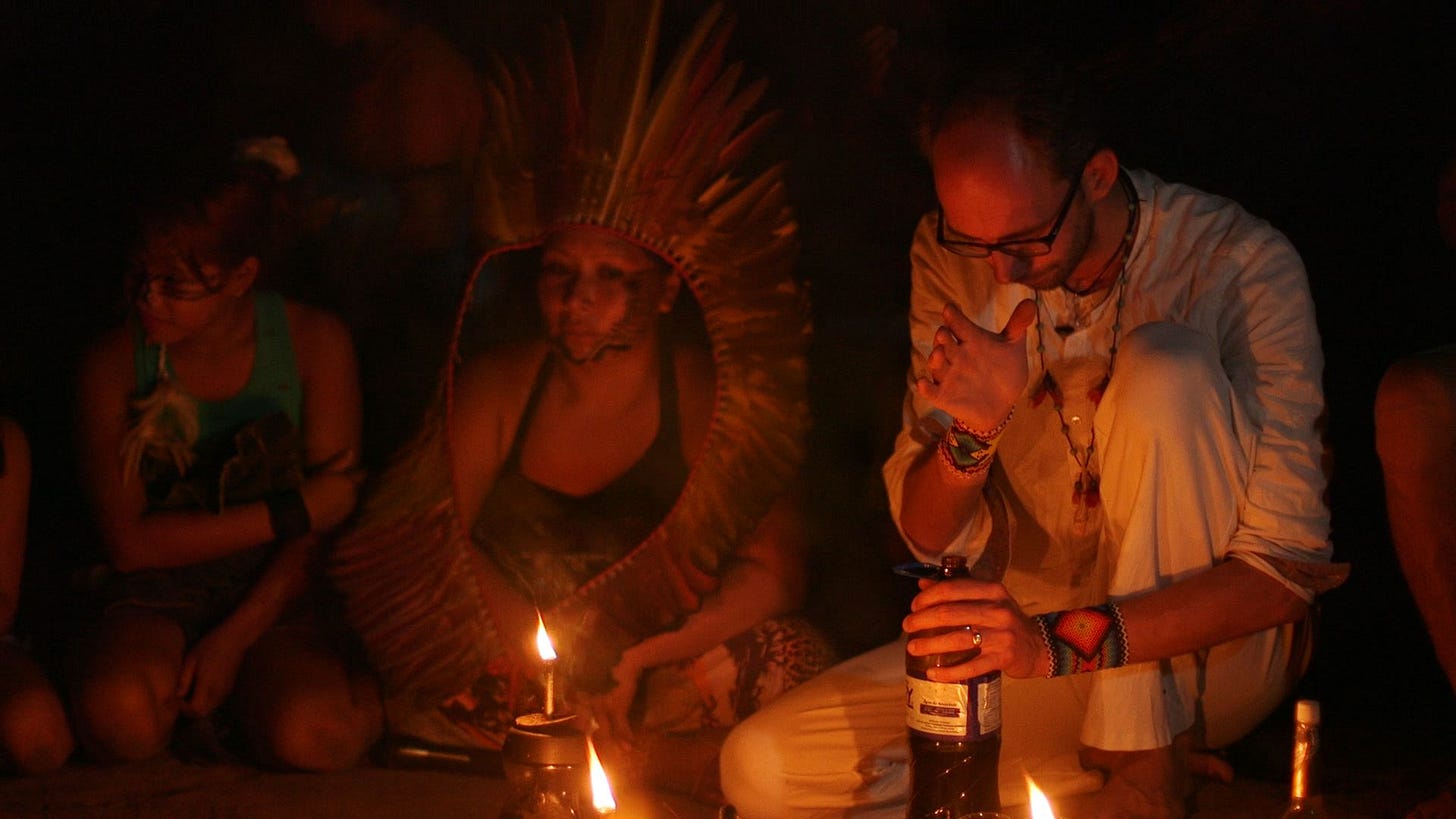
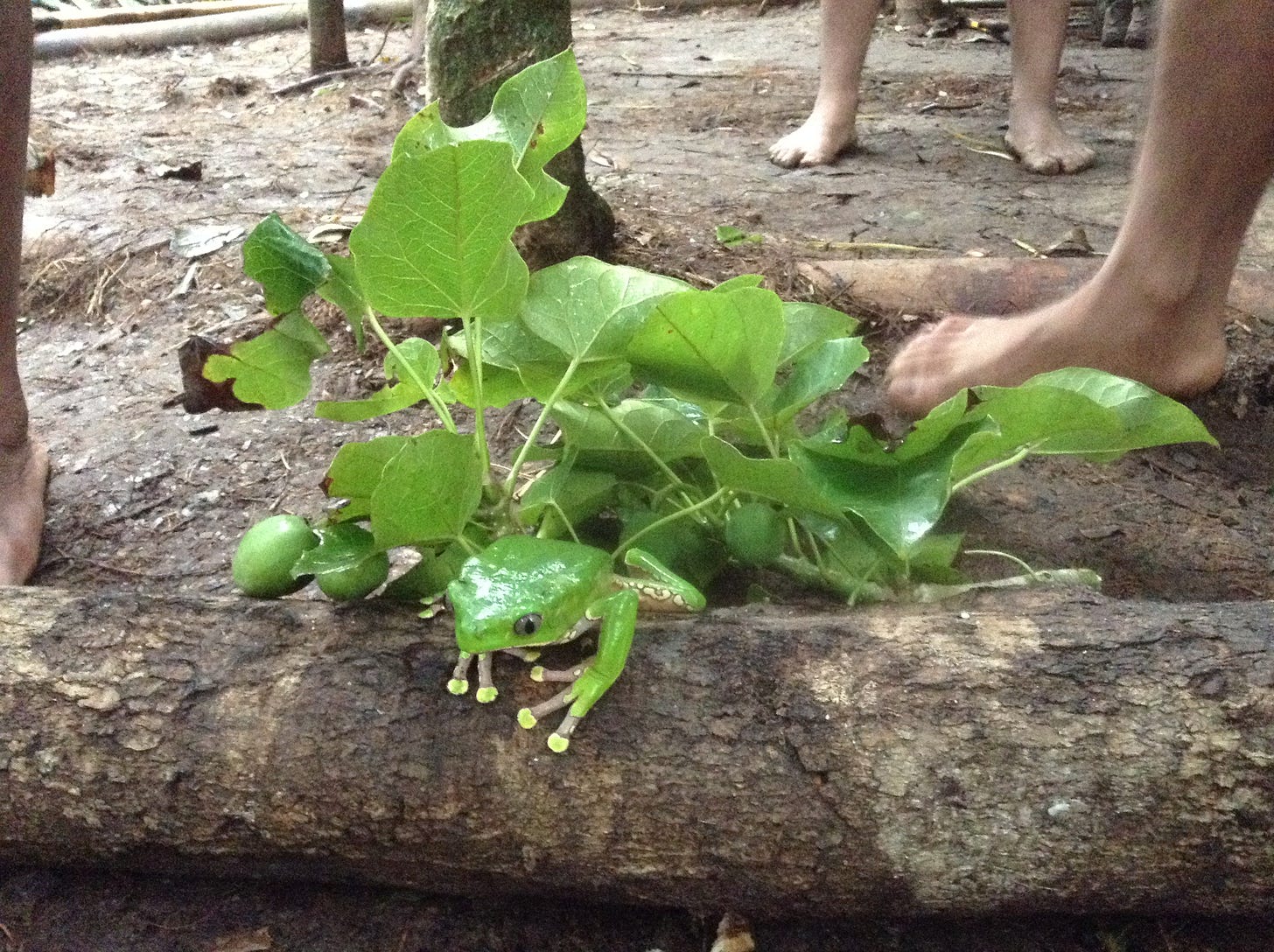
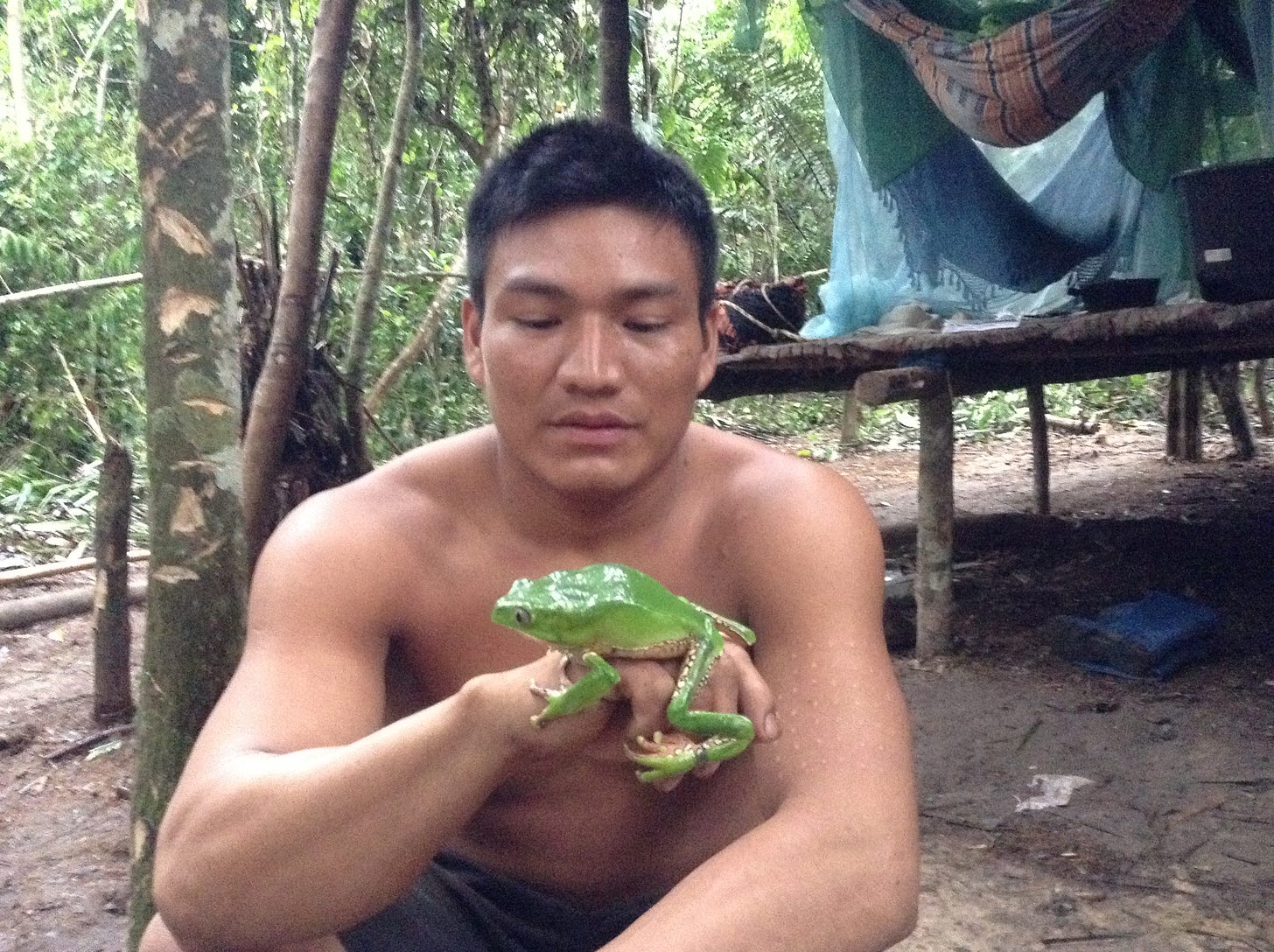
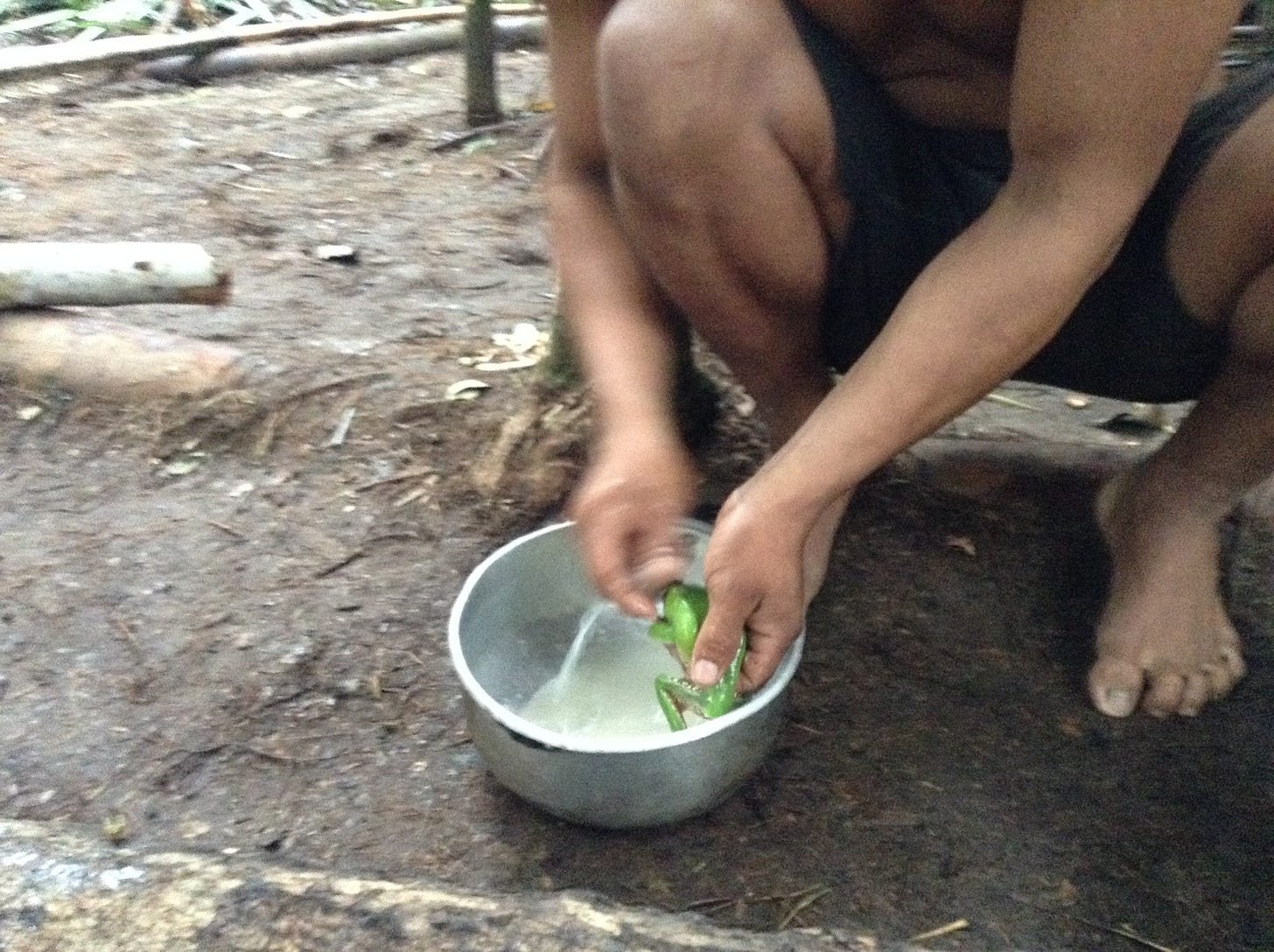


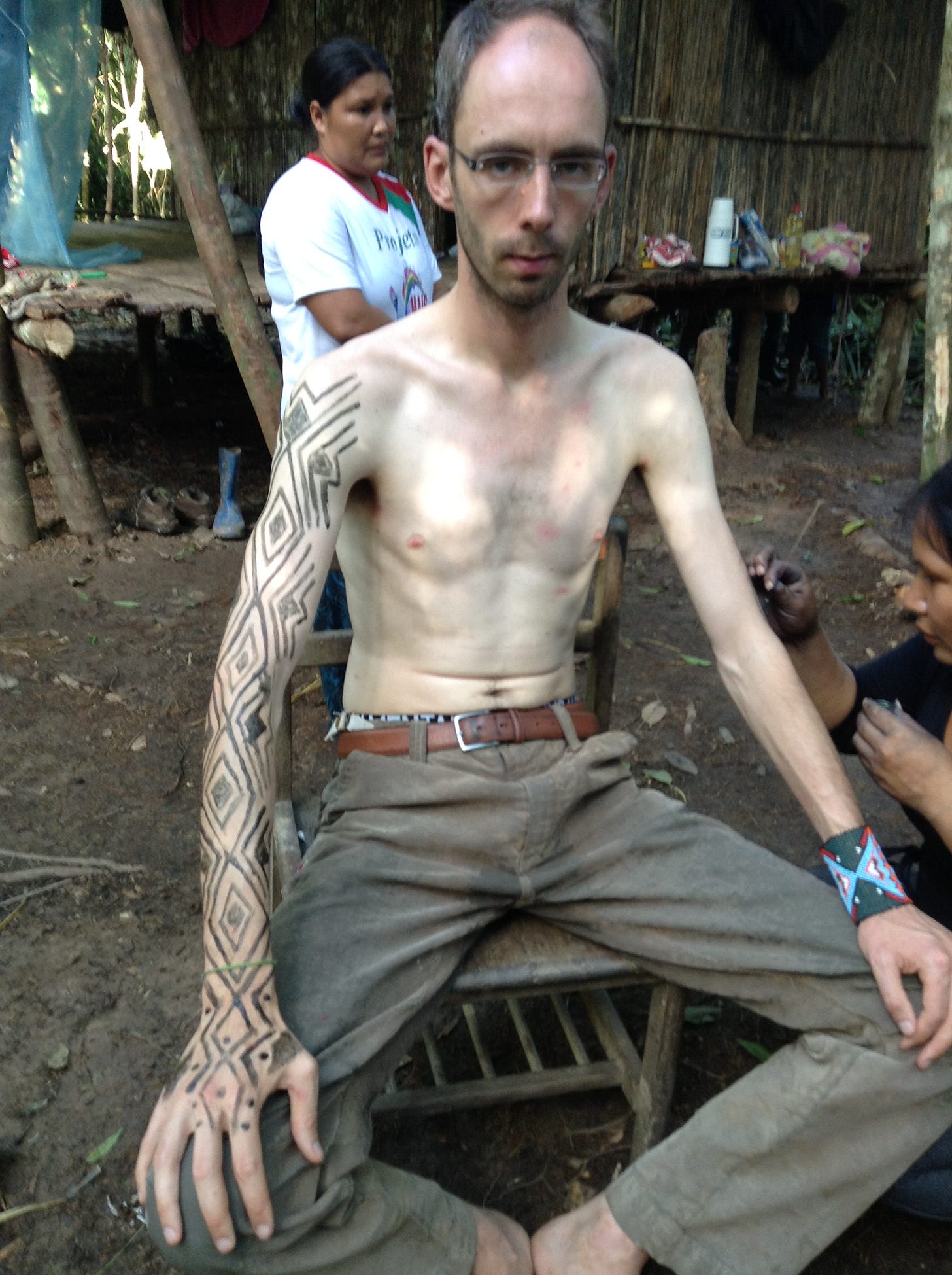
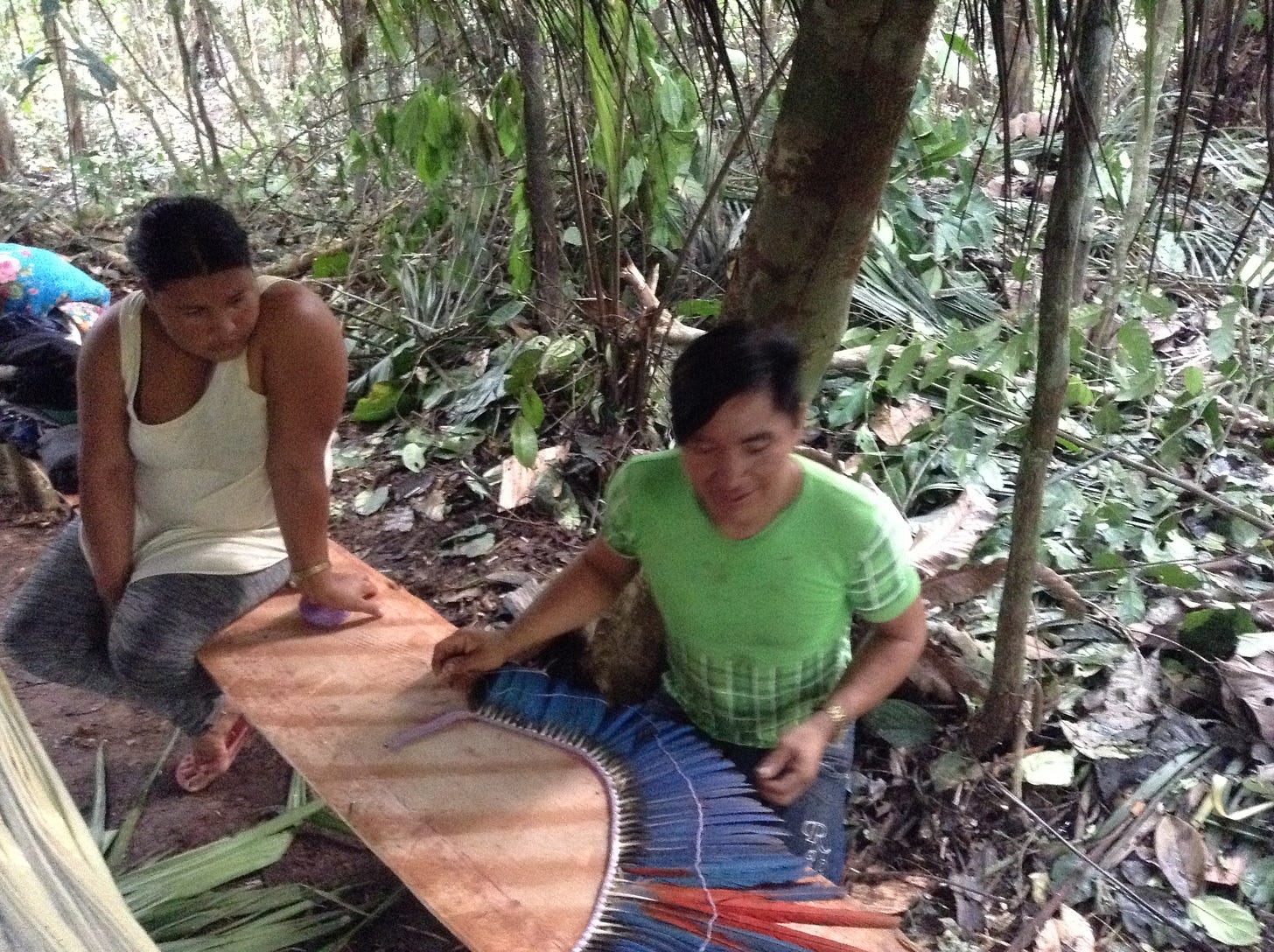
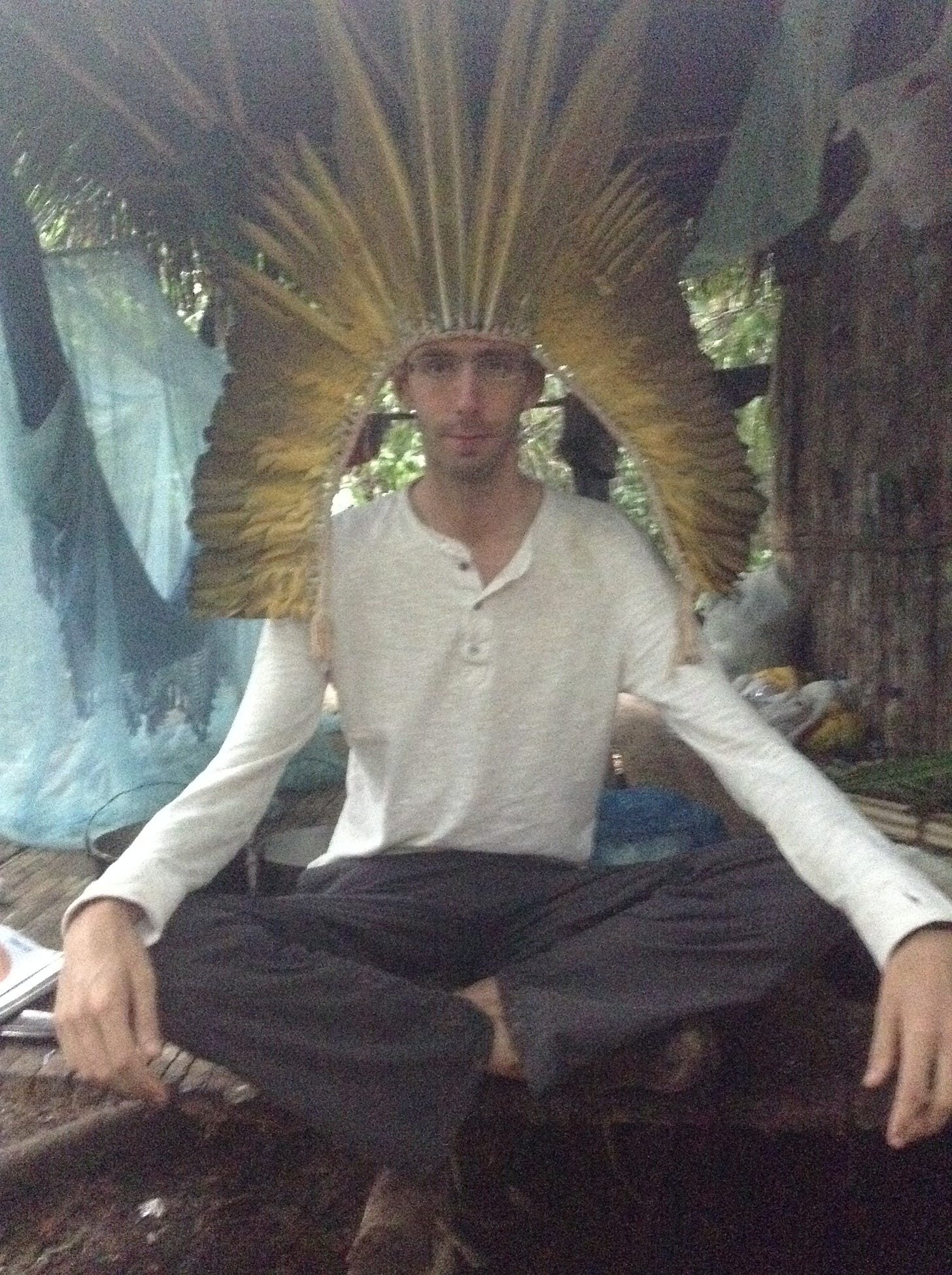


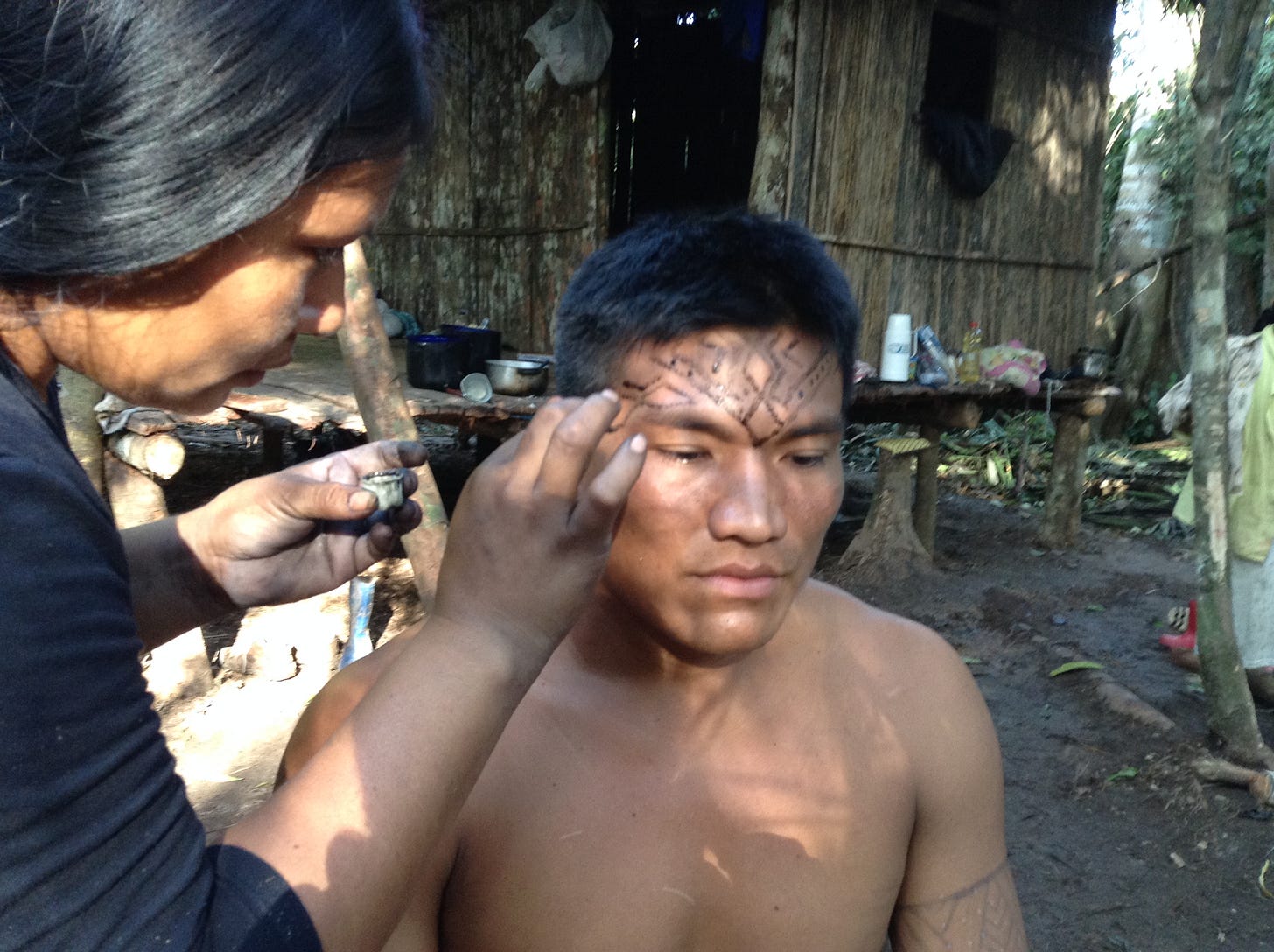

I had been waiting patiently for your writing to return brother. Much love and gratitude for all that you do and share 🤍🌿🤍
Kijk al uit naar het volgende gedeelte! Diep respect voor wat je daar hebt beleeft! Mooi dat de Santo Daime als medicijn werd gebruikt! Deep gratitude🙏🏼